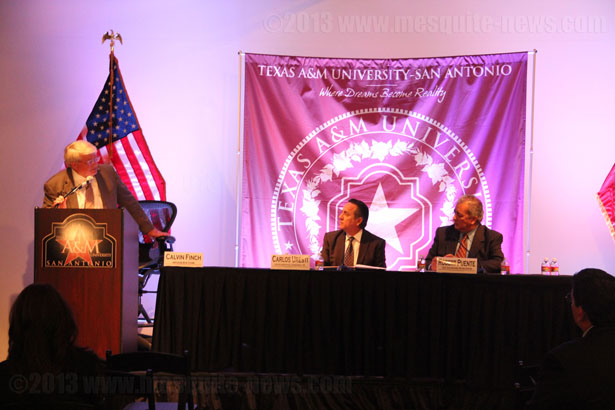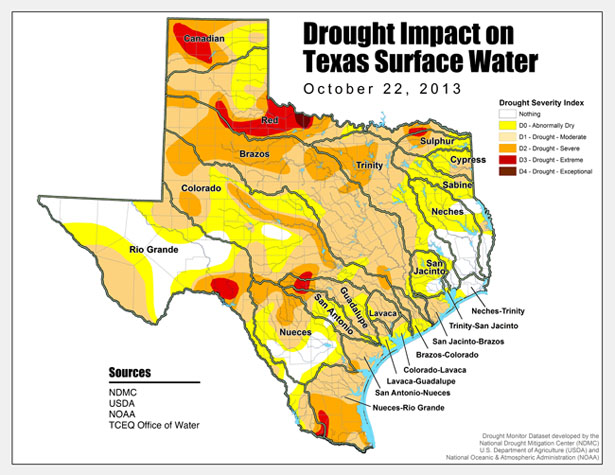
By Rebecca Salinas
Speaking to a small audience at “Proposition 6: A Public Conversation” Oct. 23, State Sen. Carlos Uresti, D-District 19, said he was in Hondo early last week to talk to farmers and ranchers about Proposition 6.
Uresti said it was interesting to see these people, who are not usually politically active, be in unanimous support for the proposition.
“They’re facing the issue of the drought in Texas. They’re facing it first hand,” he said.
Many state officials are travelling across the state to reach potential voters and explain Proposition 6 and its impact on Texans. Supporters of Proposition 6 include Gov. Rick Perry and gubernatorial candidates Greg Abbott and Wendy Davis.
Early voting began Oct. 21.
The proposition would add an amendment to the state constitution allowing the funding of water projects by creating two new funds: the State Water Implementation Fund for Texas, or SWIFT; and the State Water Implementation Revenue Fund for Texas, or SWIRFT.
The $2 billion will be transferred to SWIFT from the state’s Economic Stabilization Fund, better known as the “Rainy Day Fund.” The fund is savings to be used in case of an unexpected revenue shortfall.
The State Water Plan encompasses over 4,500 projects with a range of strategies including reuse, conservation, new reservoirs, the development of new groundwater supplies, desalination, and other projects.
Calvin Finch, discussion moderator and director of the Water Conservation and Technology Center for the TAMU System, said the proposition can be seen as a $2 billion revolving loan. The low-interest loan would be offered to water providers and local governments to help fund water projects, money which can only be used to support projects in the State Water Plan.
The Water Development Board will determine who receives funding. The board will proportion 10 percent of the funds to rural political subdivisions and agricultural water conservation and 20 percent to water conservation and reuse.
Both Uresti and Robert Puente, president and CEO of the San Antonio Water System support the proposition, but Puente added that SAWS cannot take a stance on the proposition.
Uresti said although there has been recent rainfall, the state of Texas is still in a historic drought. He added that Texas’ population is estimated to double by the year 2060 to a population of about 46.3 million.

“That’s a lot of demand, that’s a lot of housing, that’s a lot of infrastructure,” Uresti said. “Texas can no longer take the wait-and-see approach when it comes to water and the future needs of Texas.”
Uresti said, “Conservation has to be a key part of the water plan of Texas, to move forward. There is no question about it… It is something we need to be doing. It is something we should have been doing.”
Puente said people use the same amount of water every day, even though the population is growing, therefore water conservation is important.
“Every (drop of) water conserved is another drop of fresh water you don’t have to develop,” he said.
Finch asked Puente what kinds of water conservation projects will be funded.
Puente said one example is that SAWS worked with Frito-Lay on the production of potato chips, which is a water intensive process. SAWS paid Frito-Lay to upgrade a part of their facility to make sure they use less water in during product production.
He said they also worked with Coca-Cola on how to better wash bottles.
“We went and we actually paid them to change their way in doing things,” he said.
Uresti said since rural areas are in his district, he is worried that they will not have enough water in the future to maintain their land.
He said people who live in the city, or those who do not know about farming and ranching, may not be as concerned or aware because they don’t see the problem personally.
“They turn on the faucet and water comes out, and they think, ‘There’s no water problem,’” he said. “The farmers and the ranchers … are more sensitive to that fact.”
A portion of the public forum was spent discussing residents who view Proposition 6 as unnecessary.
Panelists agreed that opponents to the proposition believe neither the state, nor the Rainy Day Fund should be used to fund water projects. Instead, they believe the funds should go to public and higher education.
Uresti counters that argument saying that a no-vote on Proposition 6 does not mean that money will automatically be reinvested in public or higher education. “If the amendment does not pass Nov. 5, then the legislature is not going to say, “Put this money in ed. (education),” he said.
Puente said that state and city communities are interwoven as they share each others resources, such as food, and students.
“The weaker rural Texas is, the weaker urban Texas will be,” Puente said. “We can’t say that the state should not be involved in helping big cities fund their projects, just like we cannot say, ‘Your small town didn’t plan for the future and you’re going to go dry and that’s your problem.’”
Uresti said there is about $8 or $9 billion in the Rainy Day Fund that comes from the revenue tax oil and gas industries pay from every barrel they sell. He said the state is in “a wonderful financial position” from the success of the Permian Basin and Eagle Ford Shale that create a healthy, continuous fund.
Puente said, “There is competing interests, and we have to make sure that our water interests have their say.”
Finch asked Uresti why he believes there will be a low voter turnout.
Uresti said the proposal is not an “exciting, sexy, interesting issue.” “People, I think, don’t fully appreciate the situation,” he said to the audience of about 20 people.
Finch said students should be worried about the availability of water in Texas because if Texans do not conserve water right now, there will be an extremely limited water source in the future.






